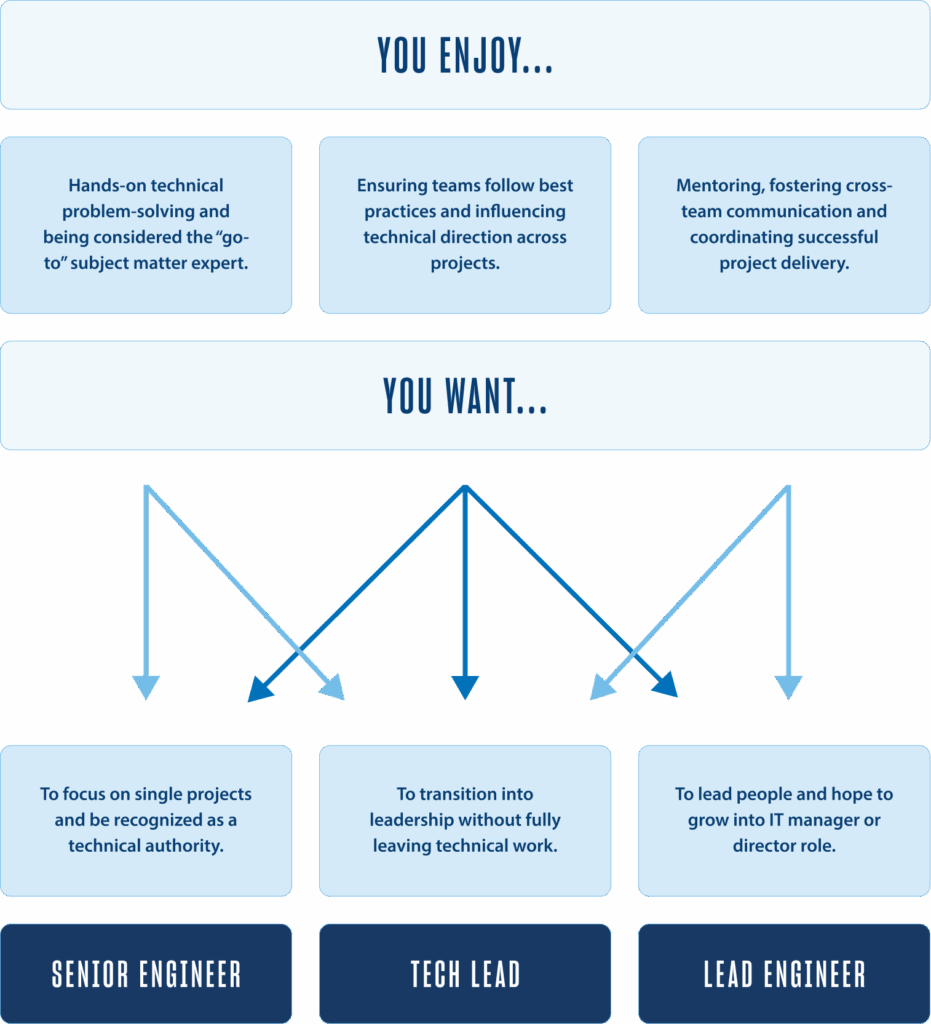As you grow in your engineering career you’ll build up experience, skills and knowledge that qualifies you for more senior-level positions. But with so many different leadership roles across industries and organizations, which is right for you?
In some ways, job titles are flexible, as the responsibilities for one position may be largely different from another organization’s position with the exact same title. However, there is a common understanding in the engineering field about what the role of certain job titles should be.
Three of the more popular leadership positions — senior engineer, lead engineer and tech lead — will generally require the same level of background experience, technical skills and level of education. However, each of these roles often has unique requirements that demand different skill sets.
So, depending on where your interests lie, you’ll want to carefully consider the differences between these leadership positions. Read on to explore the similarities and distinctions between a senior engineer vs. lead engineer vs. tech lead.
Senior Engineer Overview
What Is a Senior Engineer?
The senior engineer position is typically for individuals who have not only proven their technical skills, but also their ability to lead and mentor others. The role of senior engineer requires a balance of technical proficiency, leadership skills and innovative problem-solving capabilities. Their ability to handle complex technical problems and lead by example directly contributes to their company’s growth and success.
What Does a Senior Engineer Do?
The main responsibilities of a senior engineer are to:
- Take the lead in solving complex engineering challenges — Senior engineers play a decisive role in making strategic technical decisions that influence the current and future operations of the company. They may be asked to choose the right technology stack, design scalable system architecture or innovate solutions to enhance a product’s or system’s performance.
- Manage a company’s engineering architecture and operations — Senior engineers are instrumental in implementing engineering processes and monitoring their effectiveness. They actively participate in architecture and design meetings, contributing their knowledge and insights to shape a system’s functionality.
- Provide mentorship and team leadership — Senior engineers are expected to mentor junior team members. This includes providing guidance on projects, resolving coding issues and sharing best practices to enhance team skills and cohesiveness.
How Does a Senior Engineer Fit Within an Engineering Team?
Senior Engineers anchor the technical quality of the work. They raise the bar for technical standards while still being very hands-on.
What Does It Take to Become a Senior Engineer?
What are the Important skills for a senior engineer include:
- Expertise in multiple programming languages including Java, Python, C++ or SQL
- A deep understanding of system architecture and the ability to design scalable, efficient systems
- Familiarity with certain software development methodologies, such as Agile, Scrum, Kanban or Waterfall
- The capability to foster open communication and a collaborative working environment
- The ability to support their team and their professional development
- The capability to approach problems systematically and implement solutions under tight deadlines
- The drive to continuously update their skills and adapt to new technologies and methodologies
Educational requirements for the senior engineer position generally include:
- A bachelor’s degree — Many organizations will require that you earn a bachelor’s degree in a relevant field before being hired as or promoted to senior engineer.
- An advanced degree — While not required, some positions prefer that you have a master’s degree in specialized areas such as software engineering, systems architecture or engineering leadership.
- Professional certifications — Some certifications or specific technical certifications like AWS Certified Solutions Architect can provide you with specialized training.
According to Zippia, the average senior engineer salary in the United States is around $108,743 and tends to range between $82,000 and $144,000 depending on position, experience, location and other factors.
Lead Engineer Overview
What Is a Lead Engineer?
A lead engineer has the dual responsibilities of ensuring that an engineering team operates efficiently and that their work aligns with broader business goals. Lead engineers are asked to employ their deep technical expertise as a part of daily team management, serving as a bridge between a project’s technical and personnel aspects. Where a senior engineer is asked to assist in solving problems and mentoring others, the lead engineer position is more about coordinating solutions and providing effective management.
What Does a Lead Engineer Do?
The main responsibilities of a lead engineer are to:
- Provide hands-on oversight — Lead engineers play a direct role in upholding the technical standards of the engineering team and ensuring the successful execution of projects. They utilize their deep technical knowledge and management skills to drive their teams toward developing innovative solutions to meet established goals.
- Foster communication — Lead engineers will need to coordinate not only within their own teams, but with other project stakeholders, including project managers, product owners and external clients. They will need to be able to articulate technical concepts to non-technical stakeholders, especially when leading meetings and presentations.
- Align resources and schedules with goals — Lead engineers help ensure that all technical resources are appropriately allocated to meet established project and business goals. This involves strategic planning of resources and personnel in addition to careful task scheduling, milestone planning and timeline adjustments.
How Does a Lead Engineer Fit Within an Engineering Team?
The Lead Engineer connects technical work with project goals. They ensure the engineering team is aligned and productive, sometimes stepping back from individual contributor work to manage progress.
What Does It Take to Become a Lead Engineer?
Important skills for a lead engineer include:
- Proficiency in technical skills, tools and technologies common within an industry
- Experience with project management tools and methodologies
- The ability to manage budgets and allocate resources efficiently
- The capability to make informed decisions quickly and under pressure
- Strong interpersonal skills to foster a cooperative and productive work environment
- Attention to detail to ensure all aspects of a project align with strategic objectives
- Expertise in identifying and analyzing problems to implement solutions
Educational requirements for the lead engineer position generally include:
- A bachelor’s degree — A bachelor’s degree in a relevant field such as engineering, computer science or other technical discipline is common.
- An advanced degree — While not required, some positions prefer a master’s degree in relevant areas such as engineering management, business administration or in a specific technical field.
- Professional certifications — Some certifications such as Project Management Professional (PMP) or Certified Scrum Master (CSM) can provide you with relevant training.
According to Zippia, the average lead engineer salary in the United States is around $84,927 and tends to range between $60,000 and $120,000 depending on position, experience, location and other factors.
Tech Lead Overview
What Is a Tech Lead?
Tech leads, or technical leads, are pivotal in steering their teams and projects toward technical excellence and meeting business objectives. Tech leads play a crucial role in offering both technical guidance and leadership to ensure that projects are not only technically sound, but also aligned with business objectives. Compared to a senior or lead engineer, their role tends to focus more on how to guide teams through technical challenges, rather than offering professional guidance or improving processes.
What Does a Tech Lead Do?
The main responsibilities of a lead engineer are to:
- Set the technical direction for teams and projects — The tech lead either makes or consults on the strategic decisions that affect a project’s architecture and technology stack. This involves considering factors like performance, maintainability and scalability when choosing technologies that will best meet a project’s needs.
- Develop technical solutions that address business challenges — A tech lead needs to collaborate with the product team to understand both the technical and business aspects of a problem to devise solutions that are not only effective, but also viable within the project’s scope.
- Lead their team through technical challenges — The tech lead identifies obstacles that may impede the team’s progress and works to remove these barriers. This might involve addressing technical issues, optimizing workflows or coordinating with other departments to ensure smooth progress. They also offer guidance and support to ensure all members are productive and engaged.
How Does a Tech Lead Fit Within an Engineering Team?
The Tech Lead is the technical strategist, ensuring that engineering work today scales effectively into tomorrow. While they may still code, their primary responsibility is shaping the technical roadmap and guiding the team’s technical direction.
What Does It Take to Become a Tech Lead?
Important skills for a tech lead include:
- Expert-level knowledge in relevant programming languages such as Java, Python, C# and JavaScript
- A strong understanding of software development methodologies such as Agile, Scrum or Waterfall
- Familiarity with the latest tools and technologies, including development environments, version control systems and CI/CD pipelines
- Strong project management skills to support resource allocation, timeline management and meeting established budgets
- Excellent verbal and written communication skills to articulate details clearly to technical and non-technical stakeholders
- The ability to uphold best coding practices in day-to-day development activities, from reviewing code to ensuring the team adheres to established standards
Educational requirements for the tech lead position generally include:
- A bachelor’s degree — Some positions will ask that you earn a bachelor’s degree in a relevant field such as engineering, computer science, information systems or another area that provides a foundational understanding of technical principles.
- An advanced degree — While not required, some positions prefer a master’s degree in relevant areas such as engineering management, IT management or a specific technical field.
- Professional certifications — Some certifications relevant to specific technologies or methodologies can provide you with additional training and experience.
According to Zippia, the average technical lead/software engineer salary in the United States is around $123,110 and tends to range between $92,000 and $164,000 depending on position, experience, location and other factors.
Should you stay on a technical engineering track or change to an engineering management track? Get help choosing your career path with our free ebook: From Engineer to Leader.
Senior Engineer vs. Lead Engineer vs. Tech Lead Direct Comparison
It’s clear that all three positions have some overlap in their responsibilities. Furthermore, depending on how an organization is structured, they may not ever draw a line of distinction between a senior engineer or lead engineer position, or they could conflate the responsibilities of a lead engineer and a tech lead.
When we look to compare a lead engineer vs. senior engineer vs. tech lead, we can focus on a few specific points of general differentiation.
Duties and Responsibilities
- Senior Engineers
- Are expected to provide direction based on their deep technical expertise in specific areas like software development, system architecture or knowledge of technology stack.
- Are looked upon to provide guidance and mentorship to junior members of their team.
- Can take a more hands-on approach to projects by implementing the strategies created by the tech lead or lead engineer to ensure they’re working effectively.
- Lead Engineers
- Have a balance of technical leadership and project management responsibilities to ensure that teams are working effectively.
- Act as a bridge between the engineering team and other stakeholders such as product managers or upper management.
- Coordinate the day-to-day activities of a development team, taking into consideration suggestions from other lead positions (such as senior engineers and tech leads) to make critical decisions.
- Tech Leads
- Are responsible for the technical vision of organization, ensuring that the technology strategy supports and aligns with the larger business goals.
- Have significant influence over technical decisions and work closely with other leaders to influence the broader technology strategy.
- May create project plans and devise strategies for solving complex engineering issues, providing their suggestions to lead engineers.
Skills and Requirements
- Technical Depth vs. Breadth: Senior engineers are more likely to have deep technical skills in their specific areas of expertise. Tech leads, though also possessing deep technical skills, need to have a broader understanding of technology to support their strategic decisions. Lead engineers balance their technical skills with knowledge on team management and business development.
- Leadership and Management: Lead engineers provide comprehensive management of teams, projects and processes. Tech leads are more responsible for overseeing a team’s technical strategy and adherence to best practices. Senior engineers provide more hands-on support and are less involved in project management or cross-departmental coordination compared to lead engineers.
- Project Focus: Senior engineers are more likely to focus on single projects at a time, lending their expertise toward a successful completion. Lead engineers have a broader focus, with a responsibility to ensure that multiple projects are not only delivered, but achieve company goals. Tech leads also have a broader focus, potentially spanning multiple projects or the entire product, though their concern is entirely on how those projects adhere to an organization’s technical roadmap.
- Educational Degrees: For all of these positions, many companies will ask that you earn a bachelor’s degree in a related field. Additionally, they may prefer candidates who have several years of experience working in the engineering field and/or have earned an advanced degree or certifications.
Salary
- Senior engineer salaries typically range between $82,000 and $144,000 annually.
- Lead engineer salaries typically range between $60,000 and $120,000 annually.
- Software engineer/technical lead salaries typically range between $92,000 and $164,000 annually.
Comparison Table
| Lead Engineer | Senior Engineer | Tech Lead | |
| Skills | Balances technical skills with expertise in team management and business development. | Has deep technical expertise in specific areas such as software development, system architecture or technology stacks. | Combines deep technical skills with a broad understanding of technology to support strategic decisions. |
| Responsibilities | – Provides technical leadership and project management – Acts as a bridge between engineering teams and stakeholders – Coordinates day-to-day activities of development teams. | – Provides direction and mentorship to other engineers – Takes the lead in solving complex engineering challenges – Takes a hands-on approach to implement strategies from other leads | – Sets the technical vision to align with business goals – Influences technical decisions across projects – Creates project plans and strategies for complex engineering issues |
| Job Focus | Focuses on multiple projects, ensuring they align with company goals and are effectively managed. | Focuses on single projects, providing technical expertise to ensure successful completion. | Focuses across projects and teams to ensure they adhere to the organization’s technical roadmap. |
| Annual Salary Range | Typically between $60,000 and $120,000. | Typically between $82,000 and $144,000. | Typically between $92,000 and $164,000. |
Frequently Asked Questions
Is a lead engineer a more senior-level position than a senior engineer?
A lead engineer is often considered to have a higher rank or more responsibility than a senior engineer. The role of a lead engineer usually involves overseeing a team or a specific project, making key technical decisions and ensuring that project goals are met. In contrast, while a senior engineer focuses on complex problem solving and technical tasks, they might not have the same level of leadership or decision-making responsibilities as a lead engineer.
What is the difference between a lead engineer and a head engineer?
A lead engineer directs a project team’s day-to-day execution, ensuring delivery and alignment with goals. A head engineer (sometimes called Chief Engineer) operates at a higher level, overseeing multiple teams or an entire engineering function, setting broad technical strategy, standards and ensuring consistency across projects.
Is a tech lead a more senior-level position than a senior engineer?
A tech lead usually holds a higher position than a senior engineer. The tech lead role is responsible for making architectural decisions and guiding the direction of projects, which requires collaborating and working with other departments. A senior engineer, while highly experienced and skilled technically, typically has less responsibility in terms of team leadership and project direction.
What is the difference between a lead engineer and a tech lead?
A lead engineer manages how work gets done by managing timelines, priorities and team coordination. A tech lead defines what gets built and why, shaping the technical vision, making architectural decisions and guiding long-term engineering direction.
What is the hierarchy of engineering titles?
The hierarchy of engineering titles will vary by company, but a typical structure in many technology organizations might be as follows:
- Chief technology officer (CTO) — Top-level position responsible for the technological direction of the entire company and leading the company’s technology development.
- Vice president of engineering — A senior executive who leads the engineering division, responsible for its overall technical strategy and success.
- Director of engineering/Chief engineer — Oversees multiple teams or a significant area of the engineering department, setting technical strategy and aligning it with the business goals.
- Engineering manager — Focuses on the management of engineers and project delivery and may be involved in high-level technical decisions.
- Lead engineer/Tech lead — Responsible for the direction of projects and teams or the overall technical direction of an organization, respectively.
- Senior engineer — Experienced engineers who lead projects and handle complex problems and projects, often mentoring less experienced team members.
- Engineer — A mid-level position for those with experience.
- Junior engineer/Associate engineer — Entry-level positions for less-experienced hires
Senior Engineer vs. Lead Engineer vs. Tech Lead: Which Should You Choose?
Choosing between these positions for your career ultimately depends on your interests and skill set. If you’re more comfortable with managing the company’s tech direction than its processes, then you may be better suited for the tech lead position. On the other hand, if you’re excited by the prospect of overseeing the direction of multiple teams and projects, then you could be a great lead engineer. If you enjoy mentoring others and seeing them succeed, then you could enjoy being a senior engineer.

The bottom line is that all of these choices offer a promising future with a strong job outlook and high salary potential. It’s important to note that for all three positions an advanced education, such as a master’s degree, can provide a competitive edge and increase your marketability in these fields.





